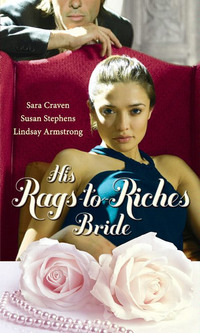
Полная версия
Rome's Revenge

PRAISE FOR SARA CRAVEN:
“Sara Craven’s latest is laced with intense overtones as she weaves together explosive characters, emotional scenes and an intricate premise.”
—Romantic Times
“Sara Craven takes a simple love story and mixes in a little betrayal and deception to come up with a very good reading experience.”
—Romantic Times
“Sara Craven puts a nice twist to a fan-favorite plot, including snappy dialogue and an interesting conflict.”
—Romantic Times
Sara Craven loves to write about powerful heroes, sizzling sexual chemistry and vibrant women determined to tame their man! Turn the pages to enjoy a story of intense passion and seductive revenge….
SARA CRAVEN was born in South Devon, and grew up surrounded by books, in a house by the sea. After leaving grammar school she worked as a local journalist, covering everything from flower shows to murders. She started writing for Mills & Boon in 1975. Apart from writing, her passions include films, music, cooking and eating in good restaurants. She now lives in Somerset.
Sara Craven has recently become the latest (and last ever) winner of the British quiz show Mastermind.
Rome’s Revenge
Sara Craven

www.millsandboon.co.uk
Contents
CHAPTER ONE
CHAPTER TWO
CHAPTER THREE
CHAPTER FOUR
CHAPTER FIVE
CHAPTER SIX
CHAPTER SEVEN
CHAPTER EIGHT
CHAPTER NINE
CHAPTER TEN
CHAPTER ELEVEN
CHAPTER TWELVE
Endpage
CHAPTER ONE
THE charity ball was already in full swing when he arrived.
Rome d’Angelo traversed the splendid marble foyer of the large Park Lane hotel and walked purposefully through the massive archway which led to the ballroom. A security man considered asking for his ticket, took a look at the dark, uncompromising face and decided against it.
Inside the ballroom, Rome halted, frowning a little at the noise of the music and the babble of laughter and chat which almost drowned it. In his mind’s eye he was seeing a hillside crowded with serried rows of vines, and a hawk hovering silently against a cloudless sky, all enshrouded in a silence that was almost tangible.
Coming here tonight was a mistake, and he knew it, but what choice did he have? he asked himself bitterly. He was gambling with his future, something he’d thought was behind him for ever. But of course he’d reckoned without his grandfather.
He accepted a glass of champagne from a passing waiter, and moved without haste to the edge of the balcony, which overlooked the ballroom floor. If he was aware of the curious glances which pursued him, he ignored them. By this time he was used to attracting attention, not all of it welcome. He’d soon learned in adolescence the effect that his six-foot-three, lean, muscular body could generate.
At first he’d been embarrassed when women had eyed him quite openly, using his broad-shouldered, narrow-hipped frame to fuel their private fantasies. Now he was simply amused, or, more often, bored.
But his attention tonight was focused on the several hundred people gyrating more or less in time with the music below him, his frowning gaze scanning them closely.
He saw the girl almost at once. She was standing at the edge of the dance floor, dressed in a silver sheath which lent no grace to a body that was on the thin side of slender and made her pale skin look tired and washed out. Like a shinny ghost, he thought critically. Yet she’d probably dieted herself into that condition, boasting about the single lettuce leaf she allowed herself for lunch.
Why the hell couldn’t she be a woman who at least looked like a woman? he wondered with distaste. And how was it, with all her money, no one had ever shown her how to dress?
For the rest, her shoulder-length light brown hair was cut in a feathered bob, and, apart from a wristwatch, she seemed to be wearing no jewellery, so she didn’t flaunt her family’s money.
She was very still, and quietly, almost fiercely alone, as if a chalk circle had been drawn round her which no one was permitted to cross. Yet he could not believe she was here unescorted.
The Ice Maiden indeed, he thought, his lips twisting with wry contempt, and definitely not his type.
He’d met them before, these girls who, cushioned by their family’s riches, could afford to stand aloof and treat the rest of the world with disdain.
And one of them he’d known well.
His frown returned.
It was a long time since he’d thought about Graziella. She belonged strictly to his past, yet she was suddenly back in his mind now.
Because, like the girl below him, she was someone who’d had it made from the day she was born. Who didn’t have to be beautiful or beguiling, which she was, or even civil, which she’d never been, because her place in life was preordained, and she didn’t have to try.
And that was why Cory Grant, in turn, could stand there, in her expensive, unbecoming gown, daring the world to keep its distance.
Dangerous things—dares, he thought, his firm mouth twisting.
Because the challenge implicit in every line of her rigid figure was making him wonder just what it would take to melt that frozen calm.
Then a slight movement focused his gaze more closely, and he realised that her hands were clenching and unclenching in the folds of the silver dress.
He thought, Ah—so there’s a chink in the lady’s armour, after all. Interesting.
And right on cue, as if she was suddenly conscious that she was being watched, she looked up at the balcony and her eyes met his.
Rome deliberately let his gaze hold hers for a long count of three, then he smiled, raised his champagne glass in a silent toast and drank to her.
Even across the space that separated them he could see the sudden burn of colour in her face, then she turned and walked away, heading for the archway which led to the cocktail bar.
If I was still gambling, he thought, what odds would I give that she’ll look round before she gets to the bar?
It seemed at first he’d have lost his money, but then, as she reached the entrance, he saw her hesitate and throw a swift glance over her shoulder, aimed at where he was standing.
The next second she was gone, swallowed up by the crowd inside the bar.
Rome grinned to himself, then drank the rest of his champagne, setting the empty glass down on the balustrade.
He took his mobile phone from the pocket of his tuxedo and dialled a number.
When his call was answered, he said, his voice cool and abrupt, ‘I’ve seen her. I’ll do it.’
He rang off, and went back the way he’d come, his long, lithe stride carrying him across the foyer and out into the chill darkness of the night.
Cory hadn’t wanted to come to the ball. And particularly she hadn’t wanted to come with Philip, who, she guessed, had been set up by her grandfather to bring her.
She thought, I really wish he wouldn’t do that, but her inner smile was tender. She knew that Arnold Grant only wanted the best for her. The problem was they’d never agree on what that ‘best’ was.
In Arnold’s view it was a husband, wealthy, steady and suitable, who would provide her with a splendid home and, in due course, babies.
For Cory it was a career, not even remotely connected with Grant Industries, and total independence.
Currently, she drew an over-generous salary as Arnold’s personal assistant, which meant that she organised his diary, made sure his domestic life ran smoothly, and acted as his hostess and companion at social events.
She felt a total fraud, knowing full well that all those activities could have fitted easily into her spare time, enabling her to do a job where she earned the money she was paid.
But Arnold insisted that he could not do without her, and had no hesitation in playing the old and frail card if he sensed she was near to rebellion.
Being allowed to move out of the big family house in Chelsea and rent a modest flat of her own had been a major concession it had taken her nearly a year of argument and cajolery to win.
‘How can you think of leaving?’ he’d protested pitifully. ‘You’re all I’ve got. I thought you’d be here with me for the few years I have left.’
‘Gramps, you’re a monster.’ Cory had hugged him. ‘You’re going to live for ever, and you know it.’
But although she no longer lived under his roof, he still felt he had carte blanche to meddle in her affairs.
And this evening was a case in point. He was a major contributor to the charity in question, and she was there to represent him, accompanied by a man who’d probably been blackmailed into bringing her.
Not, she decided, a pretty thought.
And so far it was all pretty much the disaster she’d expected. She and her escort had barely exchanged half a dozen words, and she’d seen the fleeting expression on his face when she’d emerged from the cloakroom.
You think this dress is bad? She’d wanted to say. You should have seen the ones I turned down. And I only bought it because I was running out of time and desperate, although I recognise a giant sack which also covered my face would have been a better choice.
But of course she’d said nothing of the kind. Just steadied her sinking heart and allowed him to take her into the ballroom.
And when Philip had dutifully asked her to dance with him she’d rewarded him by stepping on his foot. A painful process when your shoes were size sevens.
After which he’d hastily offered to get her a drink, and disappeared into the bar. That had been almost fifteen minutes ago, and it was more than time she went to look for him.
For all he knew, she thought, she could be lying on the floor, her face blackened and her tongue swollen with thirst.
She sighed under her breath. She always felt such a fool at these events. Such a fish out of water. For one thing, at five foot nine she was taller than most of the women. She was almost taller than Philip, which was another nail in the evening’s coffin. Thank God she’d worn low heels.
She was a lousy dancer, too, she acknowledged with detachment. She had no natural rhythm—or even basic co-ordination, if it came to that. If she could find no one else’s feet, she would fall over her own instead.
And she could usually manage a maximum of two minutes’ bright social chatter, before her brain went numb and her pinned-on smile began to hurt.
At this moment she could only think how much she’d rather be at home, curled up with a book and a glass of good wine.
But now she really ought to move, before people thought she’d been actually glued to the spot, and make an attempt to find her unfortunate escort.
Maybe she could plead a sudden migraine and let him off the hook altogether, she thought.
She wasn’t sure when she first became aware that someone was watching her.
Probably wondering if it was just the dress, or whether she’d genuinely been turned into a pillar of salt, she thought, glancing indifferently upwards.
And paused, conscious that her heart had given a sudden, unexpected lurch.
Because this was not the sort of man to give her even a passing look under normal circumstances.
And as their eyes met, some warning antenna began to send out frantic messages, screaming Danger.
He was immaculately dressed in conventional evening clothes, but a bandanna around his unruly mane of curling dark hair and a black patch over one eye would have suited him better.
Although that was utter nonsense, she castigated herself. He was probably a perfectly respectable lawyer or accountant. Certainly no buccaneer could afford the arm and leg tonight’s tickets had cost.
And it was time she stopped goggling like an idiot and beat a dignified retreat.
But, before she could move, he smiled and lifted the glass he was holding in a silent toast.
Cory could feel one of the agonising blushes that were the bane of her life travelling up from her toes.
All she had to do was turn her head and she would find the real recipient of all this attention standing behind her, she thought. Someone blonde and gorgeous, who knew how to wear clothes and probably how to take them off as well. Someone who could make a remark about the weather sound like an explicit sexual invitation.
I’m just in the way, she told herself.
But there was no one standing behind her. There was herself. And he was looking at her, and only her, smiling, as if he was watching. Waiting for her to do something.
Cory felt a sudden drop of sweat slide between her breasts like ice on her heated skin. Was aware of a swift flurry in her breathing.
Because she wanted to go to him. She wanted almost desperately to walk across the ballroom and up those wide marble stairs to where he was standing.
But, even more potently, she wanted him to come to her instead, and the swift, unexpected violence of that need jolted her out of her unwelcome trance and back to reality.
She thought, My God—this is crazy. And, more determinedly, I’ve got to get out of here—now…
She wheeled, and walked swiftly towards the cocktail bar and the errant Philip.
She risked a quick look over her shoulder and realised with mingled alarm and excitement that he was still there, still watching her, and still smiling.
My God, she thought again shakily. Philip might not be very exciting, or even marginally attentive, but at least he doesn’t look like a pirate on his night off.
She looked round the crowded bar and eventually spotted him, sitting at a corner table with a bunch of his cronies, and roaring with laughter.
It was paranoid to think she might be the subject of the joke. Indeed, all the evidence suggested that he’d completely forgotten about her.
So—I’m paranoid, she thought with a small mental shrug. But once bitten…
At the bar, she asked for a white wine spritzer, and was just about to take her first sip when someone touched her shoulder.
She started violently, sending half the contents of her glass sloshing over the hated silver dress, and turned, half in hope, half in dread.
‘Cory?’ It was Shelley Bennet, an old schoolfriend, who now worked full time for the charity. ‘I’ve been looking all over the place for you. I’d begun to think you’d chickened out.’
Cory sighed, mopping at herself with a minute lace hanky. ‘No such luck. Gramps was adamant.’
‘But surely you haven’t come on your own?’ Shelley’s frown was concerned.
‘My partner’s over there, taking a well-deserved break,’ Cory said drily. ‘I may have broken his toe.’ She hesitated. ‘Shelley, when you were in the ballroom just now, did you notice a man?’
‘Dozens,’ Shelley said promptly. ‘They tended to be dancing with women in long frocks. Strange behaviour at a ball, don’t you think?’
‘Well, this one seemed to be on his own. And he didn’t look as if dancing was a major priority.’
Ravishment, maybe, she thought, and looting, with a spot of pillage thrown in.
Shelley’s eyes glinted. ‘You interest me strangely. Where did you see him?’
‘He was up on the balcony.’ Cory gave a slight frown. ‘Usually you know exactly who’s going to be at this kind of occasion, yet he was a total stranger. I’ve never seen him before.’
‘Well, he seems to have made quite an impression,’ Shelley said with affectionate amusement. ‘You look marginally human for a change, my lamb, rather than as if you’d been carved out of stone.’
‘Don’t be silly,’ Cory said with dignity.
Shelley’s eyes danced. ‘How much to look down the guest list and supply you with a name, if not a phone number?’
‘It’s not like that,’ Cory protested. ‘It’s just such a novelty to see a new face at these things.’
‘I can’t argue with that.’ Shelley gave her a shrewd look. ‘Was it a nice new face?’
‘No, I can’t say that. Not nice, precisely.’ Cory shook her head. Not ‘nice’ at all. ‘But—interesting.’
‘In that case I shall definitely be reviewing the guest list.’ Shelley slipped an arm through her friend’s. ‘Come on, love. Point him out to me.’
But the tall stranger had vanished. And, but for the empty champagne glass on the balustrade in front of where he’d been standing, Cory would have decided he was simply a figment of her imagination.
‘Snapped up by some predatory woman, I expect,’ Shelley said with a sigh. ‘Unless he took a good look at the evening’s entertainment potential and decided that charity begins at home.’
Actually, he was taking a good look at me, Cory thought, rather forlornly. And probably writing me off as some sad, needy reject.
Aloud, she said briskly, ‘Not a bad idea, either.’
She hailed a lurking waiter, and wrote a brief note of excuse to Philip on his order pad. ‘Would you see that Mr Hamilton gets this, please? He’s at the corner table in the cocktail bar.’
Shelley regarded her darkly. ‘Are you running out on me, too—friend?’
‘’Fraid so,’ Cory told her cheerfully. ‘I’ve put in an appearance, so my duty’s done and Gramps will be mollified.’
‘Until the next time,’ Shelley added drily. She paused. ‘And what about your escort?’
‘He’s done his duty, too.’ Cory smiled reassuringly. ‘And I’d hate to have to fight off a token pass on the way home.’
‘Maybe it wouldn’t be token,’ said Shelley. She was silent for a moment. ‘Love, you aren’t still tied up over that prat Rob, are you? You haven’t let him ruin things for anyone else you might meet?’
‘I never give him a thought,’ Cory said, resisting an impulse to cross her fingers. ‘And even if I believed in Mr Right, I can tell you now that Philip doesn’t measure up.’
Shelley’s eyes gleamed. ‘Then why not opt for some good, unclean fun with Mr Wrong?’
For a brief moment Cory remembered a raised glass, and a slanting smile, and felt her heart thump all over again.
She said lightly, ‘Not really my scene. The single life is safer.’
Shelley sighed. ‘If not positively dull. Well, go home, if you must. I’ll ring you tomorrow and we’ll fix up supper and a movie. The new Nicolas Cage looks good.’
‘I had no real objection to the old Nicholas Cage,’ said Cory. She gave Shelley a brief kiss on the cheek, and went.
The cab driver was the uncommunicative sort, which suited Cory perfectly.
She sat in the corner of the seat, feeling the tensions of the evening slowly seeping away.
She needed to be much firmer with Gramps, she told herself. Stop him arranging these dates from hell for her. Because she’d laughed off Philip’s bad manners, and ducked the situation, that didn’t mean she hadn’t found the whole thing hurtful.
He’d left her standing around looking stupid, and vulnerable to patronage by some stranger who thought he was Mr Charm.
A hanging offence in more enlightened times, she told herself, as she paid off the cab and went into her building.
One disadvantage of living alone was having no one to discuss the evening with, she thought wryly, as she hung her coat in the wardrobe.
She could always telephone her mother, currently pursuing merry widowhood in Miami, but she’d probably find Sonia absorbed in her daily bridge game. And Gramps would only want to hear that she’d had a good time, so she’d have to fabricate something before she saw him next.
Maybe I’ll get a cat, she thought. The final affirmation of spinsterhood. Which at twenty-three was ridiculous.
Perhaps I should change my name to Tina, she thought. There Is No Alternative.
She carefully removed the silver dress, and placed it over a chair. She’d have it cleaned, she decided, and send it to tonight’s charity’s second-hand shop. It would do more good there than it had while she’d been wearing it. Or had it really been wearing her?
Moot point, she thought, reaching for her moss-green velvet robe. And paused…
She rarely looked at herself in the mirror, except when she washed her face or brushed her hair, but now she found she was subjecting herself to a prolonged and critical scrutiny.
The silver-grey silk and lace undies she wore concealed very little from her searching gaze, so no false comfort there.
Her breasts were high and firm, but too small, she thought disparagingly. Everywhere else she was as flat as a board. At least her legs were long, but there were deep hollows at the base of her neck, and her shoulderblades could slice bread.
No wonder her blonde, glamorous mother, whose finely honed figure was unashamedly female, had tended to view her as if she’d given birth to a giraffe.
I’m just like Dad and Gramps, she acknowledged with a sigh. And if I’d only been a boy I’d have been glad of it.
She put on her robe and zipped it up, welcoming its warm embrace.
She dabbed cleanser on to her face, and tissued away the small amount of make-up which was all she ever wore. A touch of shadow on her lids, a glow of pink or coral on her soft mouth, and a coat of brown mascara to emphasise the curling length of the lashes that shaded her hazel eyes. Her cheekbones required no accenting.
From the neck up she wasn’t too bad, she thought judiciously. It was a shame she couldn’t float round as a disembodied head.
But she couldn’t understand why she was going in for this kind of personal assessment anyway. Unless it was Shelley’s reference to Rob, and all the unhappy memories his name still had the power to evoke.
Which is really stupid, she thought quickly. I should put it behind me. Move on. Isn’t that what we’re always being told?
But some things weren’t so easy to leave behind.
She went across her living room into her small galley-kitchen and poured milk into a pan, setting it on the hob to heat. Hot chocolate was what she needed. Comfort in a mug. Not a stony trip down memory lane.
When her drink was ready, she lit the gas fire and curled up in her big armchair, her hands cupped round the beaker, her gaze fixed on the small blue flames leaping above the mock coals.
One day, she thought, she’d have a huge log fire in a hearth big enough to roast an ox.
In fact, if she wanted, she could have one next week. One word to Gramps, and mansions with suitable fireplaces would be laid open for her inspection.
Only, she didn’t want.
She’d found out quite early in life that as the sole heiress to the Grant building empire the word was hers for the asking. That her grandfather was ready to gratify any whim she expressed. Which was why she’d learned to guard every word, and ask for as little as possible.
And this flat, with its one bedroom and tiny bathroom, was quite adequate for her present needs, she thought, looking round her with quiet satisfaction.
The property company who owned it had raised no objection to her getting rid of the elderly fitted carpets and having the floorboards sanded and polished to a gleaming honey shine.
She’d painted the walls a deep rich cream, and bought a big, comfortable sofa and matching chair covered in a corded olive-green fabric.
She’d made a dining area, with a round, glass-topped table supported by a cream pedestal and a pair of slender high-backed chairs, and created an office space with a neat corner desk which she’d assembled herself from a pack during one long, fraught evening, and which held her laptop, her phone and a fax machine.
Not that she worked at home a great deal. She’d been determined from the first that the flat would be her sanctuary, and that she would leave Grant Industries behind each time she closed her door.








